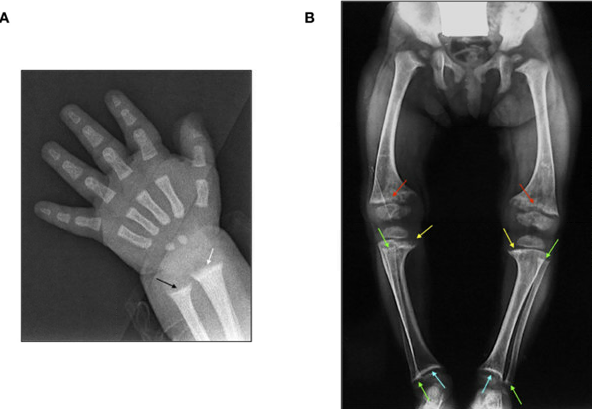Vitamin D, often called the “sunshine vitamin,” is essential for growing children. It helps build strong bones, supports healthy muscles, and plays an important role in the immune system. At Children’s Orthopaedic & Scoliosis Surgery Associates (COSSA), we emphasize bone health from infancy through adolescence—because establishing healthy vitamin D levels early sets the foundation for lifelong skeletal strength.

Vitamin D is produced in the skin when it’s exposed to sunlight and can also be found in certain foods. It helps the body absorb calcium and phosphorus—two minerals that are vital for strong bones and teeth.
Beyond bone health, vitamin D also supports muscle growth, the immune system, and the body’s ability to fight inflammation. It contributes to heart, lung, and brain health and can even help with healing after injuries.
Vitamin D deficiency means the body doesn’t have enough vitamin D to support normal growth and bone strength. This is a common issue worldwide—affecting about one billion people—and can occur even in sunny climates.
Children with darker skin, those who cover most of their skin for cultural or medical reasons, and those with limited outdoor activity are at higher risk. In the U.S., vitamin D deficiency affects both infants and adults, making awareness and prevention important at every age.

Several factors can increase the risk of vitamin D deficiency, including:
Being exclusively breastfed without a vitamin D supplement
Having darker skin pigmentation
Limited exposure to sunlight
Taking medications that interfere with vitamin D absorption or metabolism (such as certain seizure or steroid medications)
Being overweight or having a sedentary lifestyle
Even children without obvious risk factors can develop low vitamin D levels.
When children don’t get enough vitamin D, their bones may not form properly, leading to weaker bone structure. One serious condition, nutritional rickets, occurs when bones fail to mineralize correctly, causing deformities and a higher risk of fractures.
Studies show that children with low vitamin D levels are more than twice as likely to experience fractures compared to those with normal levels. The good news is that vitamin D deficiency—and the bone problems it causes—are completely preventable with proper nutrition and care.
If vitamin D deficiency is suspected, your healthcare provider may order a blood test to check your child’s levels. Treatment usually includes vitamin D supplementation and may involve your child’s pediatrician or other specialists.
Supplements are the most common way to restore healthy vitamin D levels, especially for those with limited sun exposure. Vitamin D is also found in fortified foods like milk, yogurt, and cereals, as well as fatty fish and egg yolks.
Spending time outdoors can help increase vitamin D naturally, but sunscreen should always be used to protect the skin. A few minutes of safe sunlight exposure each day, combined with healthy eating and supplementation when needed, is typically enough to maintain good levels.
Vitamin D doesn’t just support bone and muscle health—it also plays a role in preventing certain autoimmune, allergic, and infectious diseases. It contributes to brain development and helps regulate the growth of nerve cells and neurotransmitters.
Keeping vitamin D at a healthy level supports both physical and mental well-being, helping children stay strong, energetic, and resilient.
At COSSA, our team of pediatric orthopaedic specialists focuses on comprehensive bone health—because strong bones mean active, confident kids. If you have concerns about your child’s vitamin D levels or bone development, we’re here to help. To schedule an appointment, call (727) 898-2663.